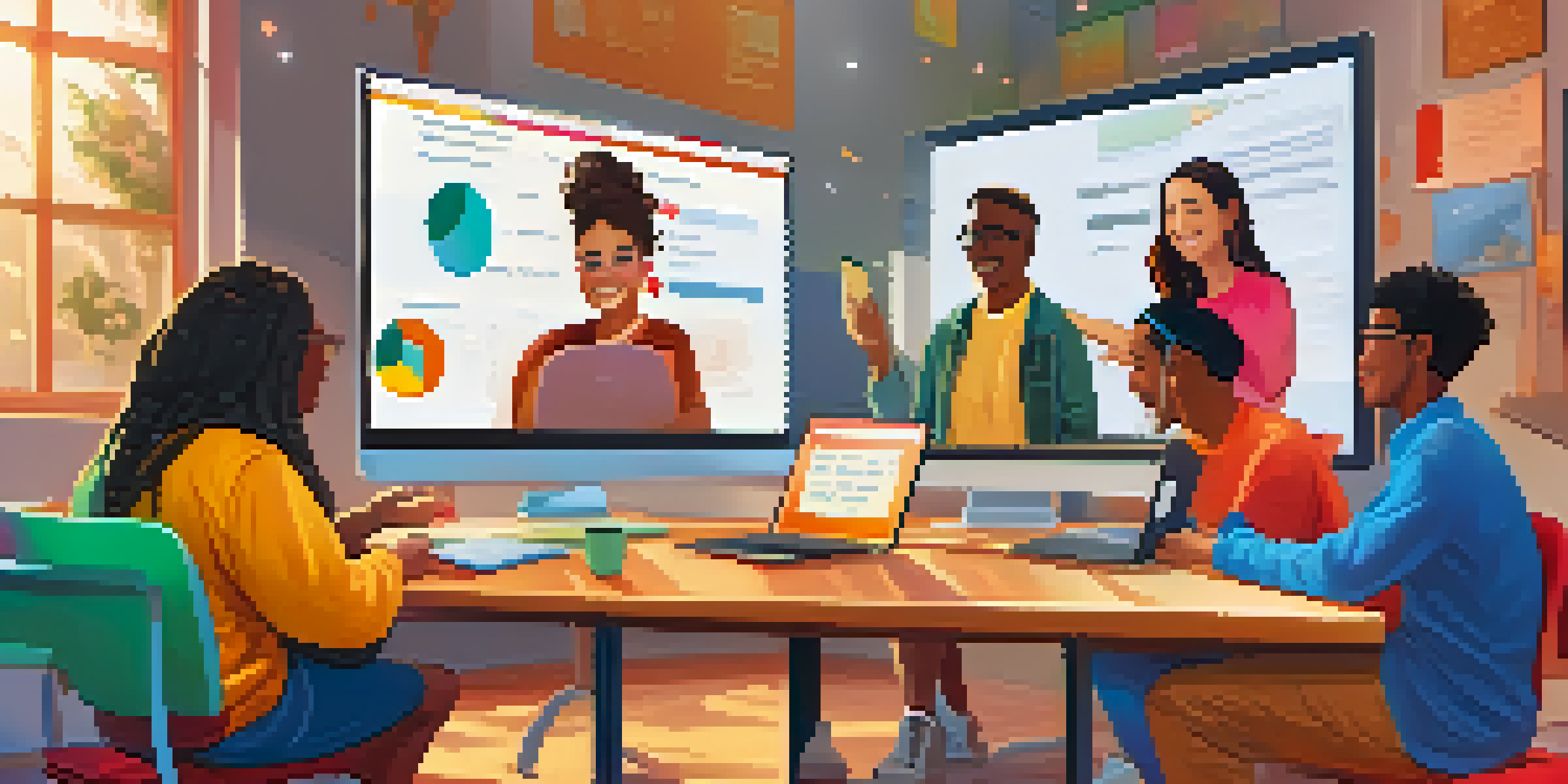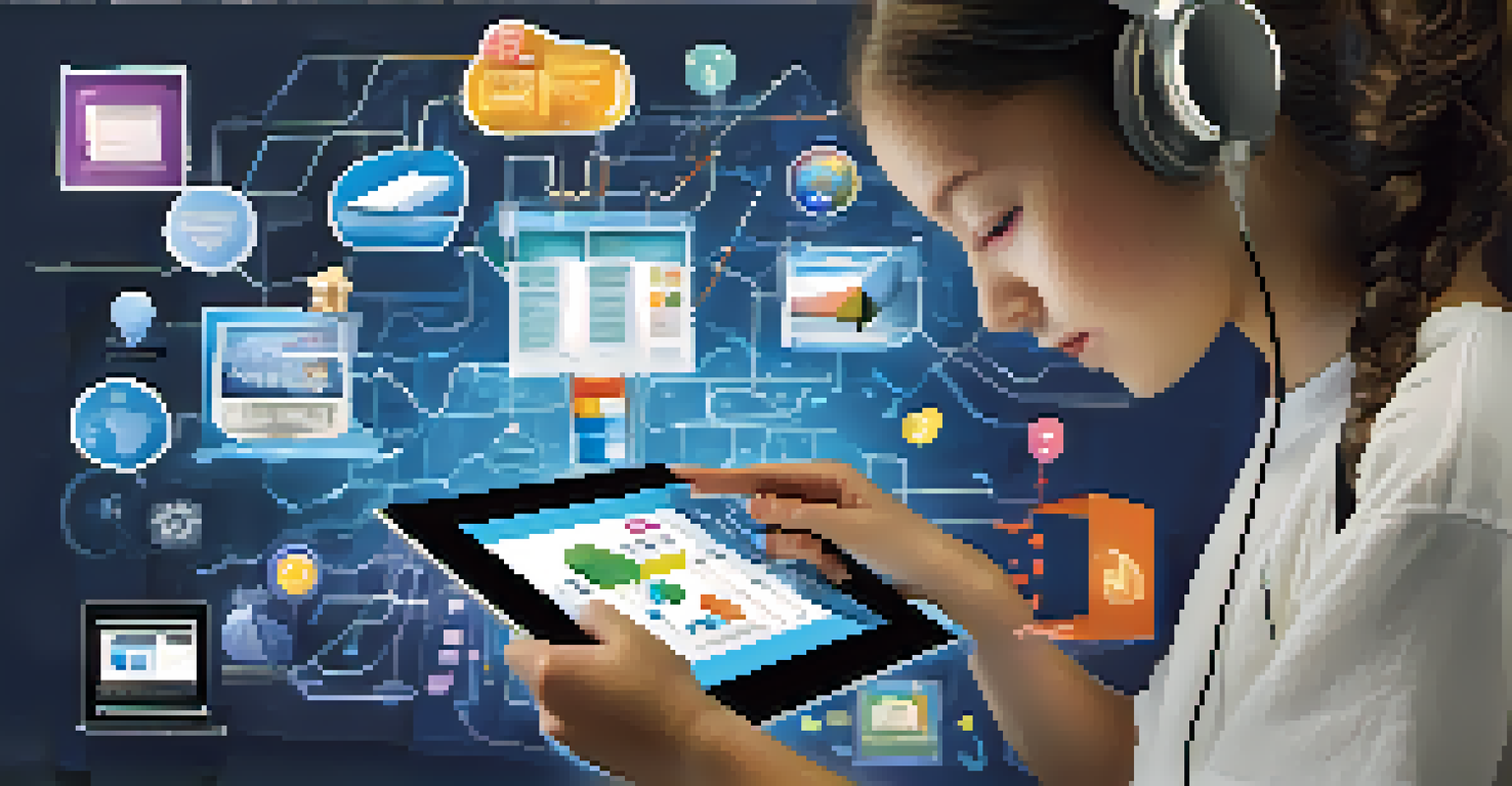How to Foster a Growth Mindset in Online Learning Environments

Understanding Growth Mindset and Its Importance
A growth mindset is the belief that abilities and intelligence can be developed through dedication and hard work. This concept, popularized by psychologist Carol Dweck, emphasizes resilience and the power of learning from failures. In online learning environments, where challenges can be more pronounced, fostering this mindset is crucial for student success.
Intelligence is not static; it can be developed. A growth mindset is essential for developing resilience and overcoming challenges.
Students with a growth mindset embrace challenges as opportunities to grow rather than obstacles to avoid. They tend to persist in the face of difficulties, viewing setbacks as a natural part of the learning process. This shift in perspective can significantly enhance motivation and engagement in an online setting, where distractions are abundant.
By cultivating a growth mindset, students can develop essential skills such as critical thinking and problem-solving. These skills not only aid in academic achievements but also prepare individuals for real-world challenges, making a growth mindset a vital component of effective online learning.
Creating a Supportive Online Learning Community
A welcoming and supportive online community can make all the difference in nurturing a growth mindset. When students feel connected to their peers and instructors, they are more likely to engage actively and share their thoughts. This sense of belonging encourages collaborative learning and helps students feel comfortable taking risks in their studies.

Instructors can foster this community by encouraging open communication and interaction among students. Activities such as discussion forums, group projects, and peer feedback sessions can help build relationships and create a collaborative learning atmosphere. When students feel supported, they are more likely to embrace challenges and seek help when needed.
Embrace Challenges for Growth
Viewing challenges as opportunities fosters resilience and enhances the learning experience.
Moreover, celebrating individual and group achievements, no matter how small, can reinforce a positive environment. Recognizing effort and improvement cultivates motivation and inspires others to strive for their own growth, ultimately enhancing the overall online learning experience.
Setting Clear Goals and Expectations
Setting clear, achievable goals is essential for fostering a growth mindset in online learning. When students understand what is expected of them, they can approach their learning with purpose and direction. Goals should be specific, measurable, attainable, relevant, and time-bound (SMART) to provide a clear roadmap for success.
Mistakes should be examined, learned from, and discarded; not dwelled upon and stored.
Instructors can work with students to create personal learning objectives that align with course outcomes. This collaborative approach not only empowers students but also reinforces their commitment to their education. Regularly revisiting and adjusting these goals helps students stay focused and resilient as they face challenges.
Additionally, sharing success stories and examples of goal-setting can inspire students. When they see how others have navigated challenges and achieved their goals, it reinforces the idea that effort leads to improvement, further embedding the growth mindset in their learning journey.
Encouraging a Culture of Feedback and Reflection
Feedback is a powerful tool for fostering a growth mindset, particularly in online learning environments. Constructive feedback helps students understand their strengths and areas for improvement, guiding their learning journey. It’s essential that feedback is timely, specific, and supportive to encourage students to view it as a path to growth.
Instructors can create opportunities for both peer and self-assessment, allowing students to reflect on their learning experiences. This reflection encourages critical thinking and helps students recognize their progress over time. By normalizing the practice of giving and receiving feedback, students learn to embrace it as an integral part of the learning process.
Build a Supportive Learning Community
Creating connections among students and instructors encourages engagement and collaborative learning.
Moreover, encouraging students to maintain a learning journal can enhance their reflective practices. Writing about their experiences and feelings regarding feedback fosters self-awareness and a deeper understanding of their personal growth, reinforcing the principles of a growth mindset.
Embracing Challenges and Viewing Failures Positively
Embracing challenges is a cornerstone of a growth mindset. In online learning, students may encounter difficulties like complex subjects or technical issues, but viewing these challenges as opportunities for growth can significantly alter their approach. Encouraging students to step out of their comfort zones prepares them for a richer learning experience.
It’s important for educators to model resilience by sharing their own challenges and how they overcame them. When students see that even their instructors face difficulties, it demystifies the learning process and helps normalize setbacks. This transparency fosters a culture where challenges are seen as a part of learning rather than a reason to give up.
Additionally, teaching students to analyze failures constructively can empower them. By discussing what went wrong and how they can improve next time, students learn that setbacks are not the end, but rather a stepping stone toward success, further solidifying their growth mindset.
Utilizing Technology to Enhance Learning Experiences
In today’s digital age, leveraging technology can greatly enhance the online learning experience. Tools such as interactive simulations, gamified learning platforms, and virtual collaboration spaces can make learning more engaging and dynamic. Utilizing these resources not only keeps students interested but also helps them develop essential skills.
Moreover, technology can facilitate personalized learning experiences, allowing students to progress at their own pace. Adaptive learning technologies can identify areas where a student may need more support, providing targeted resources that cater to individual needs. This personalized approach fosters a growth mindset by empowering students to take charge of their own learning journeys.
Set Clear Goals for Success
Establishing specific, achievable goals helps students maintain focus and motivation in their learning journey.
Furthermore, incorporating online forums and discussion boards can encourage students to share their insights and struggles. This collaboration creates a sense of community and support, reinforcing the idea that learning is a shared journey where everyone can grow together.
Promoting Lifelong Learning Beyond the Classroom
Fostering a growth mindset in online learning is not just about academic success; it’s about promoting lifelong learning. Encouraging students to pursue knowledge and skills beyond the classroom prepares them for future challenges. This mindset helps individuals remain adaptable and open to new experiences throughout their lives.
Instructors can inspire lifelong learning by sharing resources and opportunities for further study, such as online courses, workshops, and webinars. Encouraging students to set learning goals beyond their immediate academic requirements can instill a passion for continuous improvement. This approach reinforces the idea that education is a lifelong journey, not just a destination.

Moreover, highlighting the importance of curiosity and exploration can motivate students to seek out new experiences. When students learn to value learning for its own sake, they are more likely to embrace challenges and view setbacks as valuable lessons, further solidifying their growth mindset.